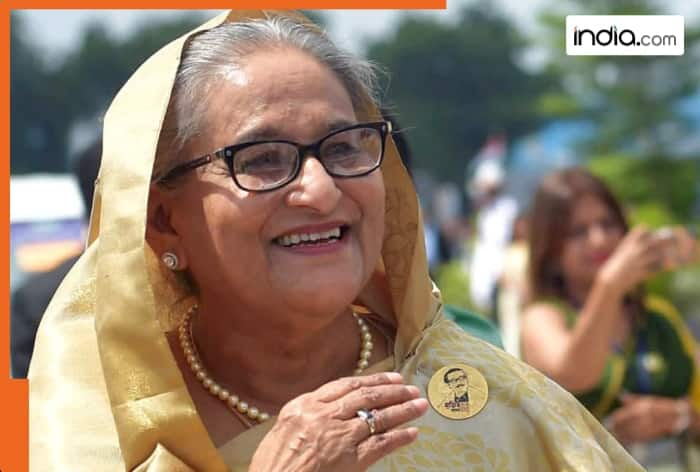Sheikh Hasina fled from Bangladesh on August 5, 2024. and since then, she has been living in a safe house in Delhi.

New Delhi: India can reject Bangladesh’s demand for former Bangladesh Prime Minister Sheikh Hasina. A 2013 extradition treaty between India and Bangladesh contains two surefire clauses that allow India to clearly refuse Bangladesh. Bangladesh’s International Crimes Tribunal (ICT) has sentenced Sheikh Hasina to death, finding her guilty of “crimes against humanity.” In the tribunal’s November 17 verdict, former Home Minister Asaduzzaman Khan Kamal was also sentenced to death. The third accused, former IG Police Chowdhury Abdullah Al-Mamun, was sentenced to five years in prison.
Sheikh Hasina fled from Bangladesh on August 5, 2024. Since then, she has been living in a safe house in Delhi. Bangladesh is now demanding that India hand over Hasina. Let’s learn from experts about the 2013 India-Bangladesh extradition treaty and understand India’s options.
Bangladesh asked for extradition; what did India say?
According to a report in the Navbharat Times, the Bangladesh Foreign Ministry asked the Indian government to hand over Sheikh Hasina to Bangladesh. “Granting asylum to these individuals, convicted of crimes against humanity, would be a serious violation of unfriendly behaviour and a travesty of justice for any other country. We urge the Indian government to immediately hand over these two convicts to Bangladeshi authorities.”
Meanwhile, the Indian Foreign Ministry stated that as a close neighbour, India is committed to the best interests of the people of Bangladesh, which includes peace, democracy, inclusiveness, and stability in that country.
India has not one but two potent weapons: Expert
According to Lieutenant Colonel (Retd.) JS Sodhi, who monitors India, Pakistan, Bangladesh, and China affairs, an extradition treaty was signed between India and Bangladesh in 2013. Articles 6 and 8 of this treaty are two Brahmastras, which give India the right to reject Bangladesh’s extradition request under this treaty. It is legally wrong to pronounce a verdict on Sheikh Hasina without hearing her side of the story. Especially in cases involving the death penalty, the accused or convict must be physically present in the court of that country.
Exceptions in Case of Political Offences
Extradition may be denied if the offence requested is of a political nature. However, subsection 2 of this section states that the following offenses will not be considered offenses of a political nature: culpable homicide, causing an explosion likely to endanger life or cause serious injury to property, manufacturing or possessing explosive substances by a person with intent to endanger life or cause serious injury to property, possession of firearms or ammunition by a person with intent to endanger life or cause serious injury to property, or any other offense related to terrorism.
Extradition May Also Be Refused Under Article 7
Under Article 7 of this Treaty, the Requested State may refuse an extradition request if the extradition offence is being prosecuted in the courts of the extradition-seeking State. However, the Requested State shall submit the case to its competent authorities for consideration of prosecution. These authorities shall make their decision in the same manner as in the case of a serious crime under the law of that State. If the competent authorities decide not to prosecute in such a case, the extradition request shall be reconsidered in accordance with this Treaty.
Grounds for Refusing Extradition under Article 8 of the Treaty
A person may not be extradited if the Requested State is convinced that, taking all the circumstances into account, extradition would be unjust or oppressive for the following reasons: Furthermore, the nature of the offence for which he is charged or convicted is minor or the time has elapsed since the commission of the offence or his illegal escape, as the case may be; or the charge against him has not been framed in good faith in the interests of justice; or the offence of which he is charged or convicted is a military offence which is not also an offence under ordinary criminal law.
Here is a 7-point cheat sheet of the case
- Bangladesh’s International Crimes Tribunal (ICT) has sentenced Sheikh Hasina to death, finding her guilty of “crimes against humanity.”
- The Bangladesh Foreign Ministry has asked the Indian government to hand over Sheikh Hasina to Bangladesh.
- The Indian Foreign Ministry stated that as a close neighbour, India is committed to the best interests of the people of Bangladesh, which includes peace, democracy, inclusiveness, and stability in that country.
- Articles 6 and 8 of the India-Bangladesh Extradition Treaty, signed in 2013, give India the right to reject Bangladesh’s extradition request.
- According to the Articles, “It is legally wrong to pronounce a verdict on Sheikh Hasina without hearing her side of the story. Especially in cases involving the death penalty.”
- Extradition may be denied if the offence requested is of a political nature.
- Under Article 7 of this Treaty, the Requested State may refuse an extradition request if the extradition offence is being prosecuted in the courts of the extradition-seeking State.

















































